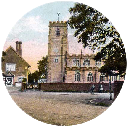

KNOWLE LOCAL HISTORY SOCIETY

THE KNOWLE RECORDS AND WHERE TO FIND THEM
Knowle Manor and the Knowle Boundaries
It is worthwhile noting one or two facts about the history of the Manor of Knowle and its boundaries, as they are relevant to where the Knowle records can be found and how they are indexed.
Present day Knowle comprises two ancient manors: Knowle and part of the older Longdon, which were eventually combined. The boundary between them was Purnell’s Brook, which runs along the back of Wychwood Avenue, crosses the Warwick Road in a culvert at Wychwood Island and continues through Job’s Close Park. The manorial boundaries extended beyond the M42 as far as Malvern Hall. Southwards the manor included Dorridge and beyond. However, until 1940 the Longdon portion of the manor remained in the ecclesiastical Parish of Solihull. The modern ward boundary was also on the Solihull side of the M42 until recent changes.
Knowle was originally part of the Manor of Hampton-in-Arden, becoming a separate manor in 1276. In 1285 it was bought by King Edward I and Queen Eleanor; but after the Queen’s death in 1290 Edward granted it to Westminster Abbey - one of 22 Westminster Manors. It remained with the abbey until it was dissolved at the reformation in 1540. Thus some old Knowle records can be found in the Westminster Abbey muniments. It is almost certainly due to the Westminster connection that Knowle was a manorial peculiar, with some matters - including wills - coming under the jurisdiction of the manor court rather than the diocese.
Knowle records can therefore be found under Knowle, Hampton-in-Arden, Solihull and also in other neighbouring parishes such as Barston.
Source material can be divided into various categories :
- primary sources, such a photographs, original documents, and personal memories (Oral History).
- secondary sources, such as books
Click the links at the top of the page for some of the most useful secondary and primary sources.
References to Knowle can be found in repositories all over the country, including the National Archive (formerly the Public Record Office), the British Library and Westminster Abbey. However, for most people, the local archives are the most useful. This web site does not pretend to provide a comprehensive guide to sources, but merely gives a few pointers to some of the Knowle records which may be of help. The main repositories are listed below . To access their web sites click on the Links button on the left.
Knowle Library
The main archive collection in Knowle is held at Knowle Library. The Enquiries Desk is open every Saturday morning from 10.30 a.m. to 12 noon or by appointment.
Knowle Local History Society Image Library
The Society holds an image library of over 2,000 photographs and other documents from various sources, to which we are continually adding as we source material for exhibitions and receive offers from the public. We also hold copies of several of the most useful documents for reference.
Knowle Parish Church Office
Knowle Parish Church holds a complete set of Knowle Parish Magazine from 1890. It also has a copy of the Knowle Monumental Survey compiled by Birmingham & District Genealogical Society. The modern registers are also retained by the Church, including burial registers for the last 100 years.
Where to Look: Other Local Repositories
Warwickshire County Record Office
Holds most of the old Knowle records, including the Parish Records, the school records and the Manorial Records, which were bequeathed to the Record Office by Knowle's last real 'squire', Horace Everitt, in 1982. There are huge amounts of material. Note that Knowle is listed under Hampton-in-Arden in the CRO index. Knowle Local History Society has copies of the index for Knowle, detailed listings for the Parish and Manorial Records and the list of wills.
Solihull Central Library
Holds the modern records such as electoral lists. Also census returns, some deeds and other records.
Shakespeare Birthplace Trust
Holds a limited amount of material. We have compiled a list of the Knowle index entries.
Birmingham Central Library
Holds the photographic survey of Warwickshire, various deeds, etc. & transcripts of some later Knowle wills.
A huge amount of material is available on-line on numerous sites. It is also worthwhile typing a subject direct into a search engine such as Google. It is beyond the scope of this brief look at the records to list the numerous sources on the internet; but it is worthwhile noting two of the most useful.
www.ancestry.com
One of the main family history sites, which is available to use free of charge in all Solihull libraries.
www.discovery.nationalarchives.gov.uk/advanced-search
A2A stands for Access to Archives and contains detailed listings from many of the county record offices. Access is free and it can reveal things in places where one would never think of looking. The usefulness of this fantastic site cannot be over-emphasised. The Advanced Search (under search box on main A2A page) is the most useful.
Note: this site has now been taken into the National Archives site and is no longer accessible via www.a2a.org